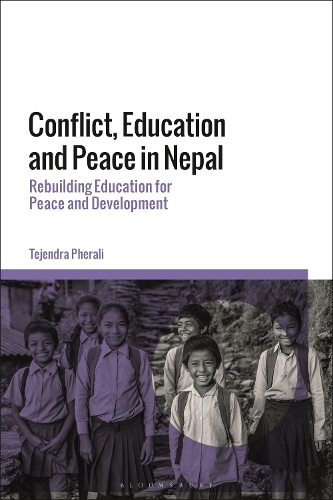
Conflict, Education and Peace in Nepal: Rebuilding Education for Peace and Development
(Hardback)
Available Formats
Publishing Details
Conflict, Education and Peace in Nepal: Rebuilding Education for Peace and Development
By (Author) Tejendra Pherali
Bloomsbury Publishing PLC
Bloomsbury Academic
25th August 2022
United Kingdom
Classifications
Tertiary Education
Non Fiction
Peace studies and conflict resolution
954.96
Physical Properties
Hardback
240
Width 156mm, Height 234mm
Description
Increasing inequalities, political movements and violent extremism across the world cause social and political instability in which education is enormously implicated. Placed firmly in this wider global context, this volume explores interactions between education and armed conflict during the Peoples War (1996 2006) in Nepal. Building upon theoretical concepts that deal with multifarious links between education and conflict, Tejendra Pherali provides a critical analysis of the contentious role of education in the emergence of conflict, as well as the effects of violence on education. Pherali engages with sociological and political theories to analyse the emergence and expansion of armed rebellion and discuss implications for peacebuilding and social transformation. He argues that education in Nepal played a complicit role in the conflict, primarily benefitting the traditionally privileged social groups in the society and hence, perpetuating the existing structural inequalities, which were the major causes of the rebellion. Schools, trapped in the middle of the conflict between the Maoists and the security forces, became a significant political space that facilitated critical education, providing intellectual strength to the violent rebellion. Exploring education after the conflict, the author argues that the reconstruction should adopt a conflict-sensitive approach to deal with issues concerning educational inequity, social exclusion, and political hegemony of the privileged social groups. The volume provides invaluable insights into post-conflict opportunities and challenges for educational reforms that align with inclusive democracy, social justice and equitable development.
Reviews
Through rich narratives, Pherali offers the reader a complex understanding of how armed conflict, legacies of social exclusion, and global forces have impacted education in Nepal. Interweaving data with sophisticated analyses drawn from critical social theory, this book provides an in-depth glimpse into the challenges and possibilities of education for peace in one of the worlds most populous regions--South Asia. * Monisha Bajaj, Professor, International and Multicultural Education, University of San Francisco, USA *
Tejendra Pherali offers an insightful and authoritative account of education in Nepal's civil conflict, locating educational injustices among the conflict's root causes, examining the impacts of the conflict on the education system, and identifying the importance of education for peacebuilding in the post-conflict education. It is essential reading for all interested in education, conflict and development. * Robin Shields, Professor of Education, University of Bristol, UK *
Author Bio
Tejendra Pherali is Professor of Education, Conflict and Peace at the IOE, UCLs Faculty of Education and Society, University College London, UK. He currently leads the research theme on Education, Conflict and Peacebuilding within the Centre for Education and International Development and is the Programme Leader for the MA Education and International Development: Conflict, Emergencies and Peace. He is involved in research projects that focus on access to and quality of learning in conflict-affected and humanitarian situations, including Afghanistan, Lebanon, Myanmar, Nepal and Thailand. He is the Chair of British Association for International and Comparative Education (BAICE) and the Editorial Board of Compare. He is also the editor of Education and Conflict Review.
